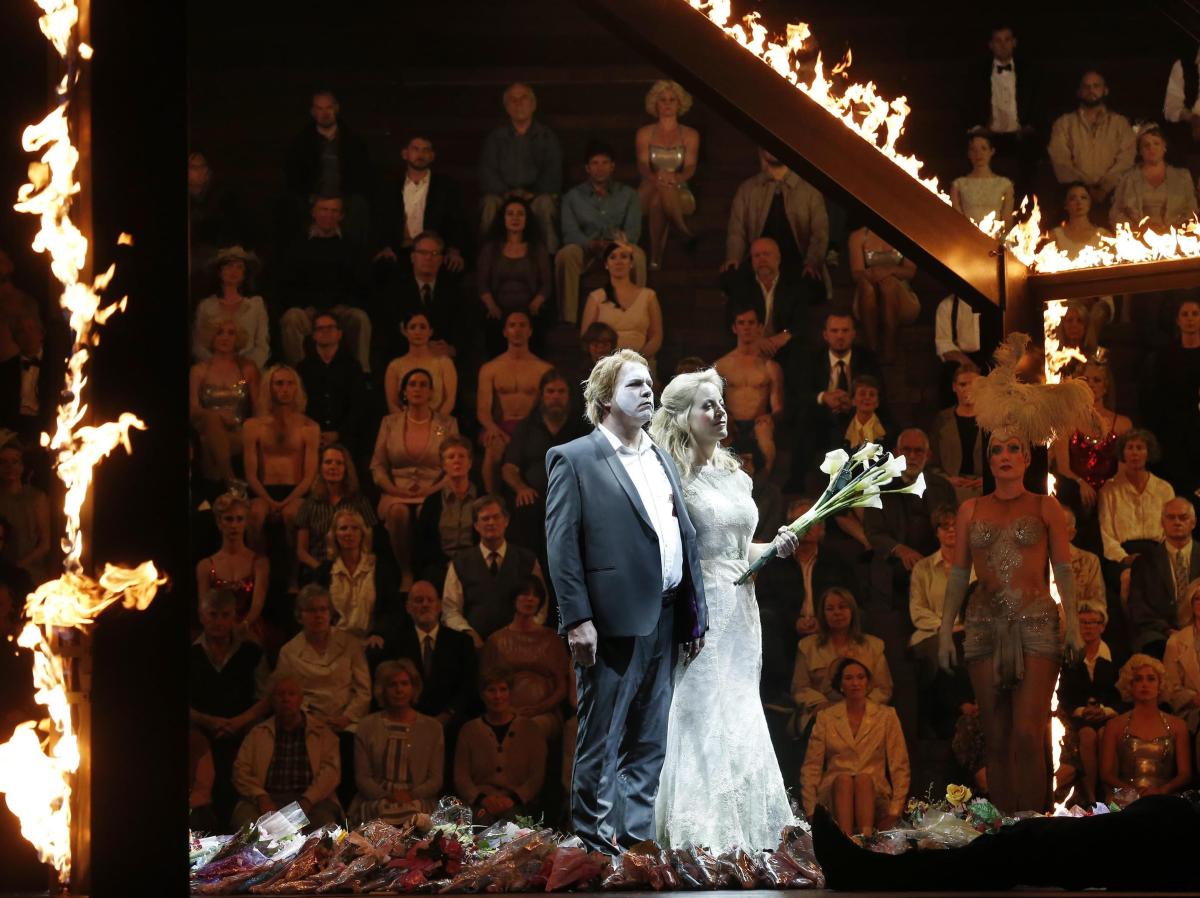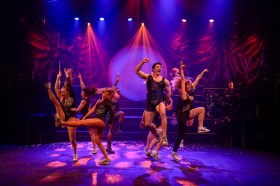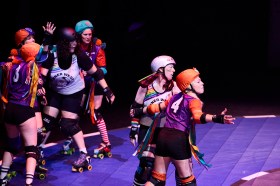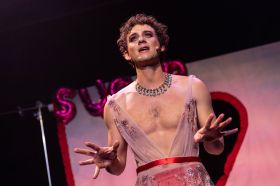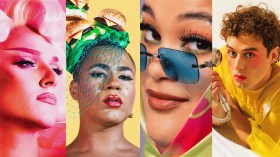Stefan Vinke as Siegfried, Lise Londstrom as Brünnhilde and the Opera Australia Chorus and ensemble in Opera Australia’s production of Götterdämmerung. Photograph by Jeff Busby.
Götterdämmerung or ‘Twilight of the Gods’, the longest of the four operas making up Wagner’s Ring Cycle and weighing in at six hours and forty minutes including two intervals, draws to a conclusion the various strands of the previous three nights in a particularly painful and bitter way. This final instalment commences in a Prologue with the Norns spinning their rope of Fate and predicting the downfall of the gods. In this production as a pleasing symmetry the Norns are presented repairing as best they can the torn historic backcloth, Walhalla by Max Brückner, that we saw pierced in Das Rheingold as the epic began. The pieces though are mismatched so that it becomes an abstract jumble of references and an indication that world order can never be restored. Young Melbourne singer Anna-Louise Cole was particularly effective as the Third Norn.
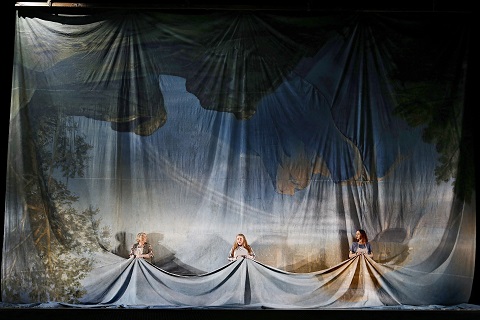
Jacqueline Dark as Second Norn, Anna-Louise Cole as Third Norn and Tania Ferris as First Norn in Opera Australia’s Götterdämmerung. Photograph by Jeff Busby.
In the following scene, as a pledge of his fidelity Siegfried leaves Brünnhilde the ring as he rides off to further adventure on her faithful flying horse Grane to the music of a powerful and sweeping orchestral interlude (‘Siegfried’s Rhine Journey’). The banal realism of this production shows the lovers entwined on a stained mattress resting on an otherwise bare stage, with Siegfried needing to clamber back into his trousers and trainers before leaving. This is cheap gimmickry, a travesty of the rapturous music and Wagner’s intent. The less said about the Melbourne Ring Volunteers’ calisthenics as Siegfried descends from the mountain into the Rhine valley, the better.
Act 1 begins in the hall of the Gibichungs on the banks of the Rhine. Gunther (Luke Gabbedy) is their leader and Hagen (Daniel Sumegi), son of Alberich, his half-brother. Both highly effective in their roles, they are presented as naval officers, Gunther a Captain and Hagen a Commander. Continuing the baffling theme of aerobics, their scene takes place in a home gymnasium complete with exercise machines and incongruous, costly paintings of wildlife and a fête champêtre. The scene soon turns to knavery as Hagen, wanting the ring for himself as Alberich’s agent, suggests that he can find a wife for Gunther in Brünnhilde and a husband for their sister Gutrune in Siegfried by plying Siegfried with a magic potion that will make him lose all memory of his love of Brünnhilde and instead fall for Gutrune. Siegfried is easily duped into winning Brünnhilde for Gunther by employing the Tarnhelm to assume the latter’s identity in a terrifying scene.
Before this happens, Brünnhilde is visited by her Valkyrie sister Waltraute who implores her to return the ring to the Rhinemaidens once and for all at the behest of her now desperate father Wotan. Throughout this highly dramatic scene Brünnhilde refuses to relinquish her bond with Siegfried as Waltraute anxiously conveys her foreboding and alarm in an impassioned performance by Sian Pendry. The calamitous double wedding that follows between Gunther and a reluctant and outraged Brünnhilde, and still-drugged Siegfried to Gutrune takes place in a white wedding marquee. In her vengeful rage, Brünnhilde is reduced by the ring’s curse to plotting with Hagen and Gunther to kill Siegfried.
The final act should open with the Rhinemaidens mourning the loss of the Rhine gold, but in fact has them looking bored and dishevelled, their ostrich-feather headdresses noticeably askew. Siegfried as part of a hunting party is given another potion by Hagen that restores his memory, allowing him to recall his earlier awakening of Brünnhilde. This gives the pretext for Hagen to dispatch Siegfried by shooting him in the back with a revolver.
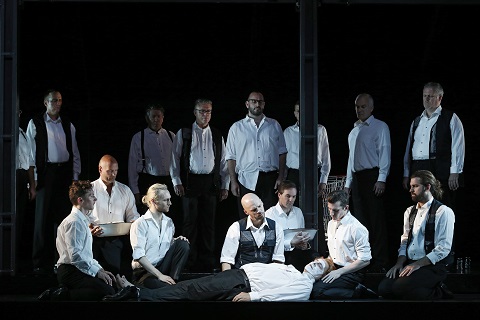
Stefan Vinke as Siegfried and the Opera Australia Chorus in Opera Australia’s production of Götterdämmerung. Photograph by Jeff Busby.
The powerful ritual music for Siegfried starts (‘Siegfried’s Funeral March’) and at Brünnhilde’s request a funeral pyre is built, the Melbourne Ring Volunteers carrying in votive bouquets. Brünnhilde (commencing her important Immolation Scene) takes the ring from the deceased Siegfried and joins him on the pyre (she’s meant to ride Grane into the flames) not before telling the Rhinemaidens to take the ring from the ashes once it has been cleansed of its fatal curse. A powerful cataclysm should follow where the Rhine floods its banks to recover the ring and Valhalla burns to the ground. The world has been destroyed (or restored) and Siegfried and Brünnhilde’s love purged and redeemed in death. Presenting Brünnhilde and Siegfried as a singed bride and groom wedding cake decoration is a miserable substitute for the end of the known world.
The 125-piece Melbourne Ring Orchestra under conductor Pietari Inkinen gave a fine performance on this closing night of the Ring, though there remained questions of balance, particularly when the brass section was at full power. It is worth noting that Wagner had his pit in mind when scoring the work. At Bayreuth only the strings are exposed to the auditorium while the heavier, louder instruments lie buried deep under the stage. Another currently insoluble issue for this most monumental of artistic achievements.
4 stars out of 5
Pietari Inkinen, conductor
Neil Armfield, director
Robert Cousins, set designer
Alice Babidge, costume designer
Damien Cooper, lighting designer
Jim Atkins, sound designer
Anthony Legge, associate conductor
Tahu Matheson, assistant conductor
Kate Champion, associate director
Roger Press, associate director
Greg Eldridge, assistant director
Tama Matheson, assistant director
James Lipari, assistant to the lighting designer
Frankie Snowdon, movement revival assistant
Cast in order of appearance:
Tania Ferris, First Norn
Jacqueline Dark, Second Norn
Anna-Louise Cole, Third Norn
Lise Lindstrom, Brünnhilde
Stefan Vinke, Siegfried
Luke Gabbedy, Gunther
Daniel Sumegi, Hagen
Taryn Fiebig, Gutrune
Sian Pendry, Waltraute
Warwick Fyfe, Alberich
Lorina Gore, Woglinde
Jane Ede, Wellgunde
Dominica Matthews, Flosshilde
Opera Australia Chorus
The Melbourne Ring Orchestra

